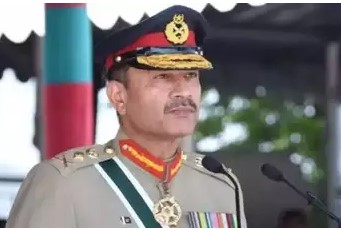
Pakistan’s Army Chief Refutes Indian Allegations of Chinese Support in May Conflict
- Pakistan News
- July 7, 2025
- No Comment

ISLAMABAD — Field Marshal Syed Asim Munir, Pakistan’s Chief of Army Staff (COAS), on Monday categorically denied Indian allegations that China provided real-time intelligence assistance to Pakistan during the May 2025 military confrontation between the two South Asian nuclear powers. He labeled the claims as baseless, misleading, and aimed at covering India’s operational failures.
Speaking to newly commissioned officers at Islamabad’s National Defence University, Munir called the allegations a “shoddy attempt at externalizing internal failures,” firmly asserting that Pakistan’s defense success was the result of indigenous strength, not foreign intervention.
Responding to Indian Army Deputy Chief Lt. Gen. Rahul Singh’s remarks—which alleged that China provided “live inputs” to aid Pakistan during the four-day conflict—Munir said:
“Attributing Pakistan’s battlefield competence to foreign actors reflects India’s reluctance to accept Pakistan’s institutional military resilience.”
He further added that dragging other countries into a bilateral military exchange was nothing more than a move to “play camp politics” and retain India’s strategic image in the region.
Rejecting claims of foreign support, Munir reaffirmed that Operation Bunyan Al Marsoos—Pakistan’s counter-operation in response to Indian strikes—was planned, led, and executed entirely by Pakistani forces.
“Our military success came from strategic foresight, tactical discipline, and technological preparedness, not from any external aid,” he said.
The operation followed deadly Indian strikes that targeted both civilian and military infrastructure on May 10, prompting what Pakistan described as a measured and effective military response.
Referring to India’s military campaign, Operation Sindoor, Munir said that New Delhi failed to achieve its declared objectives, exposing gaps in command, strategy, and operational capability.
“India’s attempt to justify failure with conspiracy theories reveals a lack of military preparedness and diplomatic desperation,” Munir said, calling it an attempt to maintain global favor while hiding domestic vulnerabilities.
In a direct message to New Delhi, the army chief warned that any future aggression targeting civilian or strategic sites would provoke a “deeply hurting and more than reciprocal response” from Pakistan.
“The onus for any escalation will rest solely on the aggressor blinded by arrogance and regional domination fantasies.”
Tensions surged following an April 2025 attack on tourists in Indian-administered Kashmir, which India blamed on Pakistan—a charge Islamabad denied. The subsequent May 7–10 conflict marked one of the most intense military confrontations between the two countries in recent years, involving drones, missiles, and artillery fire.
A ceasefire was later brokered by the United States, de-escalating the situation. However, strategic and diplomatic aftershocks continue to unfold across the region.
Thank you for reading! For comprehensive news coverage and exclusive stories, visit SafartiTarjuman.com




